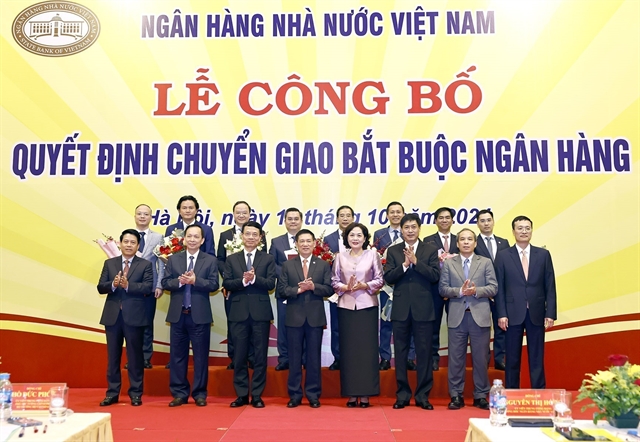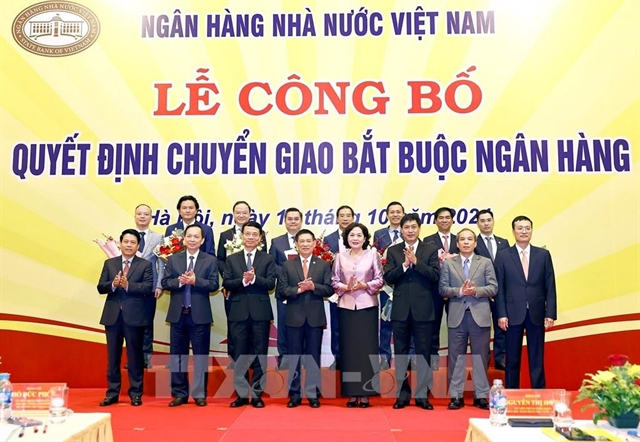 Economy
Economy

Compiled by Vũ Hoa
 |
| The ceremony to announce the transfer of two zero-đồng banks to Vietcombank and MB last week. — VNA/VNS Photo |
Restoring operations for zero-đồng banks may be seen as a challenge but also an opportunity to drive new business growth.
The Construction Commercial Bank (CB) has officially transitioned to the Joint Stock Commercial Bank for Foreign Trade of Việt Nam (Vietcombank), while the Ocean Commercial Bank (OceanBank) has been transferred to the Military Joint Stock Commercial Bank (MB).
This significant restructuring of credit institutions opens up numerous growth opportunities for both the receiving and transferred banks.
Nguyễn Thanh Tùng, chairman of the Board of Directors of Vietcombank, said that the forced transfer of a struggling credit institution is unprecedented and fraught with challenges. However, alongside the responsibility of revitalising CB’s operations, Vietcombank sees this as an opportunity to foster new business initiatives.
“After the transfer to Vietcombank, all rights, obligations, and legitimate interests of CB’s customers will be fully protected,” Tùng added.
This point was further underscored by Nguyễn Thị Hồng, Governor of the State Bank of Việt Nam.
She said that following the mandatory transfer, CB and OceanBank will operate as one-member limited liability commercial banks, with 100 per cent of their charter capital owned by Vietcombank and MB.
Under the ownership of Vietcombank and MB, all legitimate rights of depositors, along with the rights and obligations of customers at CB and OceanBank, will continue to be safeguarded in accordance with legal agreements and provisions.
The compulsory transfer of struggling credit institutions is a crucial step in restructuring the banking system. This measure is closely tied to addressing bad debts, ensuring macro-economic stability, and upholding national financial security, which is of paramount concern to the Government.
There is a strong guidance from the Government and Prime Minister Phạm Minh Chính on this matter. The central bank has actively collaborated with relevant ministries and agencies to develop a plan for these mandatory transfers and submit it for approval in line with legal regulations.
In fact, preparations for the compulsory transfer of weak banks have been underway for some time. The receiving banks have been actively engaged in supporting the zero-đồng banks during this period.
At the 2024 General Meeting of Shareholders for Vietcombank, Deputy General Director Phùng Nguyễn Hải Yến reported that Vietcombank has provided technical assistance to CB since 2015 and has lent CB over VNĐ16.7 trillion (US$664 million) in recent years. Due to regulations, this debt was classified in group 5. However, in the first quarter of 2024, following a reversal, the outstanding balance decreased to VNĐ1 trillion.
Đỗ Việt Hùng, a board member of Vietcombank, highlighted that the bank would be granted a higher credit growth limit upon accepting a weak institution, as stipulated by the 2024 Law on Credit Institutions.
Additionally, receiving banks will have the authority to determine the future direction of the transferred organisation, including the option to sell it to a suitable foreign partner or to implement reform plans, such as transitioning to a digital bank.
Similarly, at MB's General Meeting of Shareholders held in early 2024, Chairman Lưu Trung Thái expressed confidence, stating: "If the plan to accept a zero-đồng bank is approved, our growth rate will increase."
The Chairman reaffirmed MB's readiness to undertake the restructuring of a weak bank, pending Government approval, with expectations to complete the transfer process by 2024 or 2025.
Regarding the rights of banks receiving compulsory transfers, Nguyễn Đức Long, deputy chief inspector and banking supervisor at the State Bank of Việt Nam, noted that these banks will receive support in accordance with the Law on Credit Institutions and will adhere to current legal regulations.
At the announcement ceremony for the compulsory transfer of two banks on October 17, Deputy Prime Minister Hồ Đức Phớc asked the receiving and transferring banks to properly implement the approved project, urging them to allocate maximum resources to achieve the project's objectives.
Looking ahead, Thái, chairman of the Board of Directors of MB, said that the bank will prioritise resources – such as business development, capital, technology, and human resources – to support the integration of new members into the group.
This strategy aims to enhance OceanBank’s business activities, promote sustainable development, and bolster its financial and technological capabilities, ultimately contributing to the overall growth of the economy.
MB’s leadership expressed hope that in the coming months, the Government, the Prime Minister, and relevant ministries will provide support and refine policy mechanisms to ensure the successful execution of the compulsory transfer plan.
Similarly, recognising the acceptance and implementation of the compulsory transfer plan as a significant political task filled with challenges, Vietcombank Chairman Tùng committed to doing everything possible to execute the Government and State Bank of Việt Nam's policies for addressing weak credit institutions. This effort aims to stabilise financial and monetary markets while boosting public and investor confidence in the banking system.
“To fulfill this crucial political task, the entire Vietcombank system must take on great responsibility to transform CB from a weak bank under special control into a fully functioning commercial bank that contributes to the broader economy,” stated he added.
Beyond Vietcombank and MB, other commercial banks, such as Việt Nam Prosperity Joint Stock Commercial Bank (VPBank) and HCM Development Joint Stock Commercial Bank (HDBank), have also expressed interest in participating in the restructuring of weak banks.
Ngô Chí Dũng, chairman of the Board of Directors of VPBank, said that with the involvement of their Japanese partner, SMBC, VPBank has a robust capital base and various advantages for engaging in the restructuring of weak credit institutions. VPBank's strategy emphasises growth, and the interest from foreign investors remains strong. However, current regulations limit foreign ownership to 30 per cent. Participating in the restructuring would provide an opportunity to expand this limit, thereby increasing VPBank’s capital base.
Since 2011, the restructuring of commercial banks has required significant resources, particularly without relying on the State budget. Successful self-restructuring examples include the merger of Sài Gòn-Hà Nội Joint Stock Commercial Bank (SHB) with Hà Nội Housing Joint Stock Commercial Bank (Habubank), and HCM City Development Joint Stock Commercial Bank (HDBank) merging with Đại Á Joint Stock Commercial Bank (DaiABank). Both banks have shown steady growth following their mergers.
During the regular Government meeting on October 7, Governor Hồng indicated that the central bank is directing credit institutions to review their financial situations and prepare documentation for a transfer ceremony for the two zero-đồng banks, following a prolonged period of difficulty. The SBV is also expediting the assessment of the remaining two banks to report to the Prime Minister.
The four banks subject to restructuring and special control are Ocean Joint Stock Commercial Bank (OceanBank), Global Petroleum Joint Stock Commercial Bank (GPBank), Construction Joint Stock Commercial Bank (CBBank), and Đông Á Joint Stock Commercial Bank (DongA Bank).
Additionally, Sài Gòn Joint Stock Commercial Bank (SCB) has been under special control since October 2022. The SBV is conducting a comprehensive assessment of SCB's current situation to propose a restructuring plan for submission to the relevant authorities.
Locked 2G subscribers have accounts reserved
.jpg) |
| Viettel became the first provider to officially launch a 5G network last week. Photo courtesy of Viettel |
As of October 16, the Department of Telecommunications, under the Ministry of Information and Communications, reported that approximately 234,000 subscribers still using 2G-only services had not yet transitioned to the 4G network.
While these subscribers' accounts have been officially locked for two-way calling and messaging by Vietnamese telecommunications networks, they remain reserved and continue to receive assistance for transitioning to 4G.
According to the department's statistics, as of January 2024, network operators had around 18.2 million 2G-only subscribers. Under the strong direction of the Ministry of Information and Communications, telecommunications providers have expedited the process of phasing out 2G services.
In addition to actively promoting the conversion from 2G to 4G to align with technological advancements, improve customer experience, and optimise Internet resource usage, network operators are offering support to 2G device users. This includes providing devices and encouraging the adoption of attractive 4G packages and data plans.
As a result, the number of customers switching from 2G to 4G has surged in recent weeks. As of the morning of October 15, over 400,000 active 2G-only subscribers remained.
However, by the official shutdown of 2G services at 0:00 on October 16, 2024, this number had dropped to about 234,000, representing roughly 12.8 per cent of the initial total at the beginning of 2024.
A representative from VinaPhone stated that all 2G subscribers will retain their reserved accounts when the 2G signal is discontinued. VinaPhone will continue to offer free devices and support for customers, as well as home visits to assist with SIM exchanges and 4G device usage instructions. They will also provide updates on preferential policies during the initial transition period from 2G to 4G.
Similarly, a representative from Viettel noted that, according to company policy, accounts will be locked and numbers returned to the pool if customers do not use telecommunications services for two months. However, Viettel plans to implement a special policy to extend the time before numbers are reclaimed for remaining 2G subscribers.
Nguyễn Phong Nhã, deputy director of the Telecommunications Department, mentioned that network operators have established a joint database of 2G subscribers who have been unable to connect since October 16. After this date, telecommunications companies are responsible for maintaining the phone numbers, service packages and policies for these legacy subscribers.
Users can still contact their service providers for full instructions on the conversion process. Network operators prioritise user interests to ensure uninterrupted communication.
To best protect consumer interests, the Telecommunications Department is facilitating policies and solutions for continuous service provision and consumer protection.
Additionally, the Telecommunications Department has suggested that network operators consider purchasing old 2G devices as a strategy to manage electronic waste responsibly, preventing improper disposal or misuse of outdated terminals. — VNS




